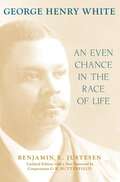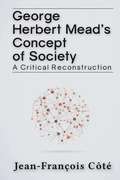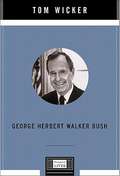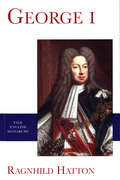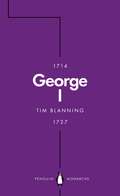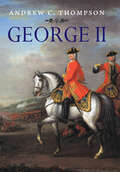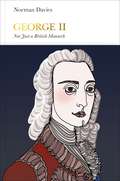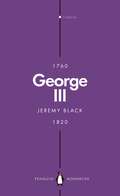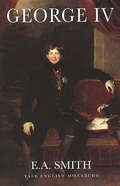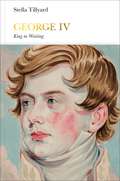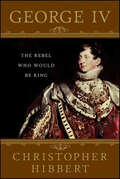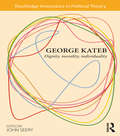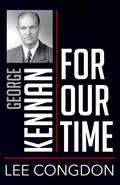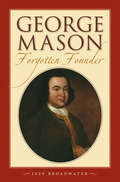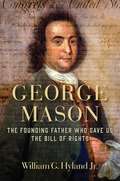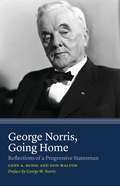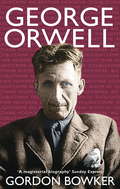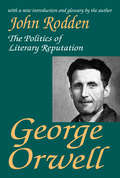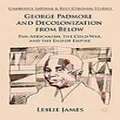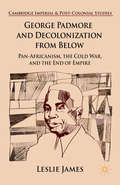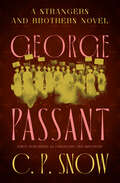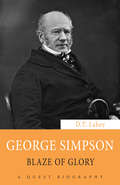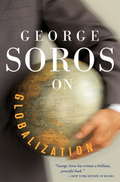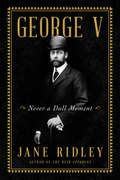- Table View
- List View
George Henry White: An Even Chance in the Race of Life (Southern Biography Series)
by Benjamin R. Justesen G. K. ButterfieldAlthough he was one of the most important African American political leaders during the last decade of the nineteenth century, George Henry White has been one of the least remembered. A North Carolina representative from 1897 to 1901, White was the last man of his race to serve in the Congress during the post-Reconstruction period, and his departure left a void that would go unfilled for nearly thirty years. At once the most acclaimed and reviled symbol of the freed slaves whose cause he heralded, White remains today largely a footnote to history. In this exhaustively researched biography, Benjamin R. Justesen rescues from obscurity the fascinating story of this compelling figure's life and accomplishments.The mixed-race son of a free turpentine farmer, White became a teacher, lawyer, and prosecutor in rural North Carolina. From these modest beginnings he rose in 1896 to become the only black member of the House of Representatives and perhaps the most nationally visible African American politician of his time. White was outspoken in his challenge to racial injustice, but, as Justesen shows, he was no militant racial extremist as antagonistic white democrats charged. His plea was always for simple justice in a nation whose democratic principles he passionately loved. A conservative by philosophy, he was a dedicated Republican to the end. After he retired from Congress, he remained active in the fight against racial discrimination, working with national leaderas of both races, from Booker T. Washington to the founders of the NAACP. Through judicious use of public documents, White's speeches, newspapers, letters, and secondary sources, Justesen creates an authoritative and balanced portrait of this complex man and proves him to be a much more effective leader than previously believed.
George Herbert Mead's Concept of Society: A Critical Reconstruction
by Jean-François CôtéThis book offers a new look at Mead's concept of society, in an attempt to reconstruct its significance for sociological theory. Chapter 1 offers a critical genealogical reading of writings, from early articles to the latest books, where Mead articulates his views on social reform, social psychology, and the gradual theorization of self and society. Chapter 2 pays attention to the phylogenetic and ontogenetic processes at work in both the self and society, by comparing Mead's social psychology with Freudian and Lacanian psychoanalysis. Chapter 3 brings together all the elements that are part of the structures of self and society within a topological and dialectical schematization of their respective and mutual relations. Chapter 4 is devoted to the passage of Mead's views from social psychology to sociology, with a critical look at Herbert Blumer's developments in symbolic interactionism as the presumed main legitimate heir of Mead's social psychology. Chapter 5 examines how Mead's general philosophical views fit within the new epistemological context of contemporary society based on communication and debates on postmodernity.
George Herbert Walker Bush
by Tom WickerNo one is more qualified to give a fully rounded, objective portrait of our forty-first president than Tom Wicker. A political correspondent for The New York Times for more than thirty years, Wicker was a first-hand witness to and reporter of George H. W. Bush’s political rise and presidential reign. In George Herbert Walker Bush, Wicker provides a richly drawn and succinct overview of Bush from his New England roots, his decorated service in World War II, and his successful oil businesses to his shift to politics and rapid rise within the Republican party. As he describes changes within the Republican party in recent decades, Wicker charts Bush’s career, including in-depth analysis of his campaign tactics and his gift for creating friendships and inspiring loyalty which, Wicker argues, has been the key to Bush’s success. The result is a fascinating, timely glimpse into one of the most powerful families in America today, complete with insights into the current reign of George W. Bush, the continued legacy of the Bush family, and contemporary American politics. .
George Herbert Walker Bush
by Tom WickerNo one is more qualified to give a fully rounded, objective portrait of our forty-first president than Tom Wicker. A political correspondent for The New York Times for more than thirty years, Wicker was a first-hand witness to and reporter of George H. W. Bush's political rise and presidential reign. In George Herbert Walker Bush, Wicker provides a richly drawn and succinct overview of Bush from his New England roots, his decorated service in World War II, and his successful oil businesses to his shift to politics and rapid rise within the Republican party. As he describes changes within the Republican party in recent decades, Wicker charts Bush's career, including in-depth analysis of his campaign tactics and his gift for creating friendships and inspiring loyalty which, Wicker argues, has been the key to Bush's success. The result is a fascinating, timely glimpse into one of the most powerful families in America today, complete with insights into the current reign of George W. Bush, the continued legacy of the Bush family, and contemporary American politics.
George I
by Ragnhild HattonIn 1714 George Ludwig, the fifty-eight-year-old elector of Brunswick-Luneburg, became, as George I, the first of the Hanoverian dynasty to rule Britain. Until his death in 1727 George served as both elector of Hanover and British monarch. An enigmatic figure whose real character has long been concealed by anti-Hanoverian propaganda, George emerges in this groundbreaking biography as an impressive ruler who welcomed the responsibilities the accession brought him and set out to bring culture to what he considered the unsophisticated English nation.Ragnhild Hatton's biography is the only comprehensive account of George's life and reign. It draws on a wide range of archival sources in several languages to illuminate the fascinating details of George's early life and dynastic crises, his plans and ambitions for the British nation, the impact of his rationalist ideas, and his accomplishments as king. The book also examines the king's private life, his family relationships in both Prussia and England, his private interest in music and the arts, and the improvement of his British and Hanoverian properties.
George I: The Lucky King (Penguin Monarchs)
by Tim BlanningGeorge I was not the most charismatic of the Hanoverian monarchs to have reigned in England but he was probably the most important. He was certainly the luckiest.Born the youngest son of a landless German duke, he was taken by repeated strokes of good fortune to become, first the ruler of a major state in the Holy Roman Empire of the German Nation and then the sovereign of three kingdoms (England, Ireland and Scotland). Tim Blanning's incisive short biography examines George's life and career as a German prince, and as King. Fifty-four years old when he arrived in London in 1714, he was a battle-hardened veteran, who put his long experience and deep knowledge of international affairs to good use in promoting the interests of both Hanover and Great Britain. When he died, his legacy was order and prosperity at home and power and prestige abroad. Disagreeable he may have been to many, but he was also tough, determined and effective, at a time when other European thrones had started to crumble.
George II: King and Elector (The English Monarchs Series)
by Andrew C. ThompsonDespite a long and eventful reign, Britain's George II is a largely forgotten monarch, his achievements overlooked and his abilities misunderstood. This landmark biography uncovers extensive new evidence in British and German archives, making possible the most complete and accurate assessment of this thirty-three-year reign. Andrew C. Thompson paints a richly detailed portrait of the many-faceted monarch in his public as well as his private life. Born in Hanover in 1683, George Augustus first came to London in 1714 as the new Prince of Wales. He assumed the throne in 1727, held it until his death in 1760, and has the distinction of being Britain's last foreign-born king and the last king to lead an army in battle. With George's story at its heart, the book reconstructs his thoughts and actions through a careful reading of the letters and papers of those around him. Thompson explores the previously underappreciated roles George played in the political processes of Britain, especially in foreign policy, and also charts the intricacies of the king's complicated relationships and reassesses the lasting impact of his frequent return trips to Hanover. George II emerges from these pages as an independent and cosmopolitan figure of undeniable historical fascination.
George II: Not Just a British Monarch (Penguin Monarchs)
by Norman DaviesFrom the celebrated historian and author of Europe: A History, a new life of George IIGeorge II, King of Great Britain and Ireland and Elector of Hanover, came to Britain for the first time when he was thirty-one. He had a terrible relationship with his father, George I, which was later paralleled by his relationship to his own son. He was short-tempered and uncultivated, but in his twenty-three-year reign he presided over a great flourishing in his adoptive country - economic, military and cultural - all described with characteristic wit and elegance by Norman Davies. (George II so admired the Hallelujah chorus in Handel's Messiah that he stood while it was being performed - as modern audiences still do.) Much of his attention remained in Hanover and on continental politics, as a result of which he was the last British monarch to lead his troops into battle, at Dettingen in 1744.
George III: Madness and Majesty (Penguin Monarchs)
by Jeremy BlackKing of Britain for sixty years and the last king of what would become the United States, George III inspired both hatred and loyalty and is now best known for two reasons: as a villainous tyrant for America's Founding Fathers, and for his madness, both of which have been portrayed on stage and screen.In this concise and penetrating biography, Jeremy Black turns away from the image-making and back to the archives, and instead locates George's life within his age: as a king who faced the loss of key colonies, rebellion in Ireland, insurrection in London, constitutional crisis in Britain and an existential threat from Revolutionary France as part of modern Britain's longest period of war.Black shows how George III rose to these challenges with fortitude and helped settle parliamentary monarchy as an effective governmental system, eventually becoming the most popular monarch for well over a century. He also shows us a talented and curious individual, committed to music, art, architecture and science, who took the duties of monarchy seriously, from reviewing death penalties to trying to control his often wayward children even as his own mental health failed, and became Britain's longest reigning king.
George IV
by E. A. SmithThis engrossing biography of George IV, king of England from 1820 to 1830, gives a full and objective reassessment of the monarch's character, reputation, and achievement. Previous writers have tended to accept the unfavorable verdicts of the king's contemporaries that he was a dissolute, pleasure-loving dilettante and a feeble and ineffective ruler who was responsible for the decline of the power and reputation of the monarchy in the early nineteenth century. Now E.A. Smith offers a new view of George IV, one that does not minimize the king's faults but focuses on the positive qualities of his achievement in politics and in the patronage of the arts.Smith explores the roots of the king's character and personality, stressing the importance of his relationship with his parents and twelve surviving siblings. He examines the king's important contributions to the cultural enhancement of his capital and his encouragement of the major artistic, literary, and scholarly figures of his time. He reassesses the king's role as constitutional monarch, contending that it was he, rather than Victoria and Albert, who created the constitutional monarchy of nineteenth-century Britain and began the revival of its popularity. Smith's biography not only illuminates the character of one of the most colorful of Britain's rulers but also contributes to the history of the British monarchy and its role in the nation's life.
George IV: King in Waiting (Penguin Monarchs)
by Stella TillyardGeorge IV spent most of his life waiting to become king: as a pleasure-loving and rebellious Prince of Wales during the sixty-year reign of his father, George III, and for ten years as Prince Regent, when his father went mad. 'The days are very long when you have nothing to do' he once wrote plaintively, but he did his best to fill them with pleasure - women, art, food, wine, fashion, architecture. He presided over the creation of the Regency style, which came to epitomise the era, and he was, with Charles I, the most artistically literate of all our kings. Yet despite his life of luxury and indulgence, George died alone and unmourned. Stella Tillyard has not written a judgemental book, but a very human and enjoyable one, about this most colourful of all British kings.
George IV: The Rebel Who Would Be King
by Christopher Hibbert“One of the most satisfying biographies of an English king: it is ample, convincing and well written”—from the acclaimed author of The House of Medici (The Times Literary Supplement).Christopher Hibbert delivers a superbly detailed picture of the life and times of George IV including his exorbitant spending on his homes, his clothes, and his women; his patronage of the arts; his “illegal” marriage to Catholic Mrs. Fitzherbert, and lesser known facts such as his generous charity donations and his witty one-liners, including one he uttered when he met his bride-to-be (Caroline of Brunswick) for the first time: “Harris, I am not well, fetch me a brandy.” George IV was the son of George III (who went insane and inspired The Madness of King George) and was the founder of the prestigious King’s College in London.“A delight to read . . . an enormously enjoyable and skillful portrait.” —Philip Ziegler, The Spectator“Christopher Hibbert’s George IV is at once soundly based on research in the Royal Archives at Windsor and a rollicking good read. I found it invaluable when I was researching The Unruly Queen, my life of George IV’s wife, Queen Caroline, and I recommend it to anyone interested by George IV’s flamboyant and outrageous personality.” —Flora Fraser, author of Flora Macdonald: “Pretty Young Rebel”
George Kateb: Dignity, Morality, Individuality (Routledge Innovators in Political Theory)
by John SeeryGeorge Kateb’s writings have been innovatory in exploring the fundamental quandary of how modern democracy—sovereignty vested in the many—might nevertheless protect, respect, promote, even celebrate the singular, albeit ordinary individual. His essays, often leading to unexpected results, have focused on many inter-related topics: rights, representation, constitutionalism, war, evil, extinction, punishment, privacy, patriotism, and more. This book focuses in particular on his thought in three key areas: Dignity These essays exhibit the breadth and complexity of Kateb’s notion of dignity and outline some implications for political theory. Rather than a solely moral approach to the theory of human rights, he elaborates a human-dignity rationale for the very worth of the human species Morality Here Kateb challenges the position that moral considerations are often too demanding to have a place in the rough-and-tumble of modern politics and political analysis. Rejecting common justifications for the propriety of punishment, he insists that state-based punishment is a perplexing moral problem that cannot be allayed by repairing to theories of state legitimacy. Individuality These essays gather some of Kateb’s rejoinders and correctives to common conceptions and customary critiques of the theory of democratic individuality. He explains that Locke’s hesitations and religious backtracking are instructive, perhaps as precursors for the ways in which vestigial beliefs can still cloud moral reasoning.
George Kennan for Our Time (People for Our Time)
by Lee CongdonGeorge Kennan for Our Time examines the work and thought of the most distinguished American diplomat of the twentieth century and extracts lessons for today. In his writings and lectures, Kennan outlined the proper conduct of foreign policy and issued warnings to an American society on the edge of the abyss. Lee Congdon identifies the principles Kennan applied to US relations with Russia and Eastern Europe, and to the Far and Near East. He takes particular note of Kennan's role in formulating postwar policy in Japan, measured response to North Korea's invasion of South Korea, and opposition to the war in Vietnam. Congdon also considers Kennan's strong criticisms of his own country, its egalitarianism, unrestricted immigration, and multiple addictions. He cites Kennan's call for a greater closeness to nature, a revival of religious faith, and a return to the representative government established by the Founding Fathers. George Kennan for Our Time describes the often-disastrous results of rejecting Kennan's counsel, and the dangers, international and national, posed by an ongoing failure to draw upon his wisdom. In view of America's foreign policy disasters in Afghanistan, Iraq, and around the world, Kennan's realist approach provides important lessons for our current age.
George Mason, Forgotten Founder
by Jeff BroadwaterGeorge Mason (1725-92) is often omitted from the small circle of founding fathers celebrated today, but in his service to America he was, in the words of Thomas Jefferson, "of the first order of greatness." Jeff Broadwater provides a comprehensive account of Mason's life at the center of the momentous events of eighteenth-century America. Mason played a key role in the Stamp Act Crisis, the American Revolution, and the drafting of Virginia's first state constitution. He is perhaps best known as author of the Virginia Declaration of Rights, a document often hailed as the model for the Bill of Rights.As a Virginia delegate to the Constitutional Convention in Philadelphia, Mason influenced the emerging Constitution on point after point. Yet when he was rebuffed in his efforts to add a bill of rights and concluded the document did too little to protect the interests of the South, he refused to sign the final draft. Broadwater argues that Mason's recalcitrance was not the act of an isolated dissenter; rather, it emerged from the ideology of the American Revolution. Mason's concerns about the abuse of political power, Broadwater shows, went to the essence of the American experience.
George Mason: The Founding Father Who Gave Us the Bill of Rights (George Mason Lectures #Vol. Vi)
by William G. Hyland Jr.George Mason was a short, bookish man who was a friend and neighbor of athletic, broad-shouldered George Washington. Unlike Washington, Mason has been virtually forgotton by history. But this new biography of forgotten patriot George Mason makes a convincing case that Mason belongs in the pantheon of honored Founding Fathers. Trained in the law, Mason was also a farmer, philosopher, botanist, and musician. He was one of the architects of the Declaration of Independence, an author of the Bill of Rights, and one of the strongest proponents of religious liberty in American history. In fact, both Thomas Jefferson and James Madison may have been given undue credit for George Mason's own contributions to American democracy.
George Norris, Going Home: Reflections of a Progressive Statesman
by Gene A. Budig Don WaltonAfter forty years of congressional service, five terms in the House and five in the Senate, George William Norris (1861–1944) was going home to Nebraska. Norris had lost the 1942 Senate race and felt the defeat keenly. But as his train rolled westward, he was forcefully reminded of what his legislative efforts had wrought, from the Tennessee Valley Authority (TVA) to the Rural Electrification Act (REA), which brought power to the land unfolding before him. It is here that authors Gene A. Budig and Don Walton begin their journey with this great statesman, perhaps the last progressive Republican, a tireless champion of &“public power&” and the common man.This book carries readers back through Norris&’s career and accomplishments: the establishment of the TVA and the REA as well as the Twentieth Amendment to the Constitution and the shaping of Nebraska&’s unique unicameral legislature. Norris recalls the battles he waged, one of which landed him in John F. Kennedy&’s Profiles in Courage, and the alliances he formed with leading political figures of his day, from Fiorello La Guardia to Franklin D. Roosevelt. The result is a contemporary perspective on a man who fiercely defended the public interest and followed his convictions to the lasting benefit of his state and his country.
George Orwell
by Gordon Bowker'Adds enormously to our understanding of the man' Evening StandardGeorge Orwell was one of the greatest writers England produced in the last century. He left an enduring mark on our language and culture, with concepts such as 'Big Brother' and 'Room 101.' His reputation rests not only on his political shrewdness and his sharp satires (Animal Farm and Nineteen Eighty-Four) but also on his marvellously clear style and superb essays, which rank with the best ever written. Gordon Bowker's new biography includes fascinating new material which brings Orwell'slife into unfamiliar focus. He writes revealingly about Orwell's family background; the lasting influence of Eton on his work and character; his superstitious streak and youthful flirtation with black magic; and his chaotic and reckless sex life, which included at least one homoerotic relationship. It highlights the strange circumstances of his first marriage and provides remarkable new evidence of his experiences in Spain and their nightmarish consequences. It also offers a fresh look at his peculiar deathbed marriage to a woman fifteen years his junior. All this has enabled Bowker to give Orwell's life a brilliantly fresh and distinctive interpretation.
George Orwell: The Politics of Literary Reputation
by John RoddenThe making of literary reputations is as much a reflection of a writer's surrounding culture and politics as it is of the intrinsic quality and importance of his work. The current stature of George Orwell, commonly recognized as the foremost political journalist and essayist of the century, provides a notable instance of a writer whose legacy has been claimed from a host of contending political interests. The exemplary clarity and force of his style, the rectitude of his political judgment along with his personal integrity have made him, as he famously noted of Dickens, a writer well worth stealing. Thus, the intellectual battles over Orwell's posthumous career point up ambiguities in Orwell's own work as they do in the motives of his would-be heirs. John Rodden's George Orwell: The Politics of Literary Reputation, breaks new ground in bringing Orwell's work into proper focus while providing much original insight into the phenomenon of literary fame.Rodden's intent is to clarify who Orwell was as a writer during his lifetime and who he became after his death. He explores the dichotomies between the novelist and the essayist, the socialist and the anti-communist and the contrast between his day-to-day activities as a journalist and his latter-day elevation to political prophet and secular saint. Rodden's approach is both contextual and textual, analyzing available reception materials on Orwell along with audiences and publications decisive for shaping his reputation. He then offers a detailed historical and biographical interpretation of the reception scene analyzing how and why did individuals and audiences cast Orwell in their own images and how these projected images served their own political needs and aspirations. Examined here are the views of Orwell as quixotic moralist, socialist renegade, anarchist, English patriot, neo-conservative, forerunner of cultural studies, and even media and commercial star. Rodden concludes with a consideration of the meaning of Or
George Padmore and Decolonization from Below
by Leslie JamesFrom his base in London, the Trinidad-born Marxist, George Padmore, was a central figure ofmid-twentieth century pan-Africanism who became critically involved in debates about thenature and practice of European imperialism. Focusing on Padmore's political manoeuvring, Leslie James traces his politics through the ongoing influence of the Caribbean and thelegacy of the Garvey movement; the international communist movement and Sovietdecolonization; debates about fascism and colonialism; the new 'reform' rhetoric apparentin World War II; the beginnings of the Cold War; and, pivotally, post-war African politicsthat confronted a wealth of new dynamics including independent Ghana, apartheid SouthAfrica, and the Mau Mau Emergency in Kenya. Within the ideas and political practice of thisforthright man lie a number of common questions about the circulation of ideas, the shapeof black radical thought, and the weight of Cold War politics within the modern history ofEuropean imperialism and the end of empire.
George Padmore and Decolonization from Below: Pan-Africanism, the Cold War, and the End of Empire (Cambridge Imperial and Post-Colonial Studies Series)
by L. JamesThis book argues that the rising tide of anti-colonialism after the 1930s should be considered a turning point not just in harnessing a new mood or feeling of unity, but primarily as one that viewed empire, racism, and economic degradation as part of a system that fundamentally required the application of strategy to their destruction.
George Passant (The Strangers and Brothers Novels)
by C.P. SnowA wise, moving novel about a mentor and his protégé: &“The central character . . . is immensely appealing . . . a peculiarly haunting and sympathetic figure.&” —The New York Times In late 1920s England, Lewis Eliot is building a career in law and has found a mentor in George Passant. The quirky small-town solicitor&’s clerk has much wisdom to share from his years of experience—during which he has also managed to hold on to his idealism. Eliot is just one of the many young devotees drawn to Passant, hoping for guidance from the man who&’s always ready to extend a loan or a listening ear. However, the young men will have to learn to fly on their own—and come to Passant&’s aid themselves—in this absorbing novel by &“an extremely shrewd observer of men and society&” (Commentary). &“An enlightened discussion of questions of conscience and conduct and commitment. . . . Filled with the concerns which are so fundamentally and essentially a part of this writer&’s work and have attracted a firm following.&” —Kirkus ReviewsOriginally published under the title Strangers and Brothers
George Simpson: Blaze of Glory
by D. T. LaheyBorn in Scotland and trained as a sugar broker in London, England, Sir George Simpson (1792-1860) was unexpectedly appointed in 1820 as governor of Rupert’s Land and the Indian territories, an area encompassing all of Canada from Hudson Bay to the Pacific Ocean. By his friendliness of manner, strict discipline, and vigorous and constant travel, he brought peace and prosperity to the vast empire under his control.Simpson’s explorations opened Canada from Labrador to British Columbia and from Yukon to Nunavut. He was knighted in 1841, then travelled around the world, predicting the fall of California to the United States, saving the Hawaiians from colonial occupation, and describing the mysteries of remotest Siberia. Praised as the governor who "combined the widest range of authority and the longest tenure of power ever enjoyed by one man in North America," he stands with Sir John A. Macdonald as one of the greatest Makers of Canada.
George Soros On Globalization
by George SorosNow in paperback: George Soros' powerful and brilliant report on the state of our international institutions (New York Review of Books)
George V: Never a Dull Moment
by Jane RidleyFrom one of the most beloved and distinguished historians of the British monarchy, here is a lively, intimately detailed biography of a long-overlooked king who reimagined the Crown in the aftermath of World War I and whose marriage to the regal Queen Mary was an epic partnershipThe grandfather of Queen Elizabeth II, King George V reigned over the British Empire from 1910 to 1936, a period of unprecedented international turbulence. Yet no one could deny that as a young man, George seemed uninspired. As his biographer Harold Nicolson famously put it, "he did nothing at all but kill animals and stick in stamps.” The contrast between him and his flamboyant, hedonistic, playboy father Edward VII could hardly have been greater.However, though it lasted only a quarter-century, George’s reign was immensely consequential. He faced a constitutional crisis, the First World War, the fall of thirteen European monarchies and the rise of Bolshevism. The suffragette Emily Davison threw herself under his horse at the Derby, he refused asylum to his cousin the Tsar Nicholas II during the Russian Revolution, and he facilitated the first Labour government. And, as Jane Ridley shows, the modern British monarchy would not exist without George; he reinvented the institution, allowing it to survive and thrive when its very existence seemed doomed. The status of the British monarchy today, she argues, is due in large part to him.How this supposedly limited man managed to steer the crown through so many perils and adapt an essentially Victorian institution to the twentieth century is a great story in itself. But this book is also a riveting portrait of a royal marriage and family life. Queen Mary played a pivotal role in the reign as well as being an important figure in her own right. Under the couple's stewardship, the crown emerged stronger than ever. George V founded the modern monarchy, and yet his disastrous quarrel with his eldest son, the Duke of Windsor, culminated in the existential crisis of the Abdication only months after his death.Jane Ridley has had unprecedented access to the archives, and for the first time is able to reassess in full the many myths associated with this crucial and dramatic time. She brings us a royal family and world not long vanished, and not so far from our own.
